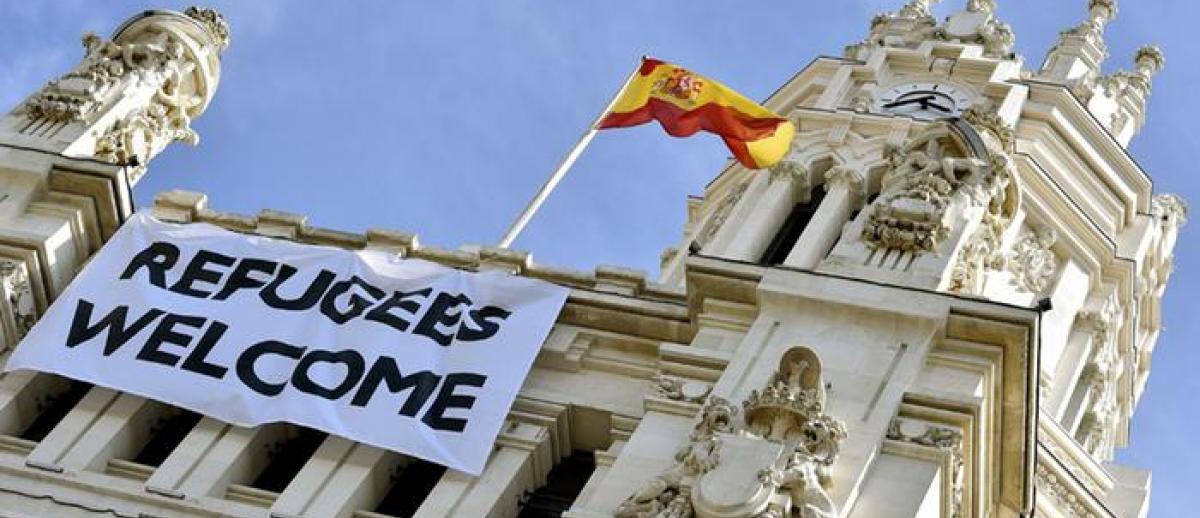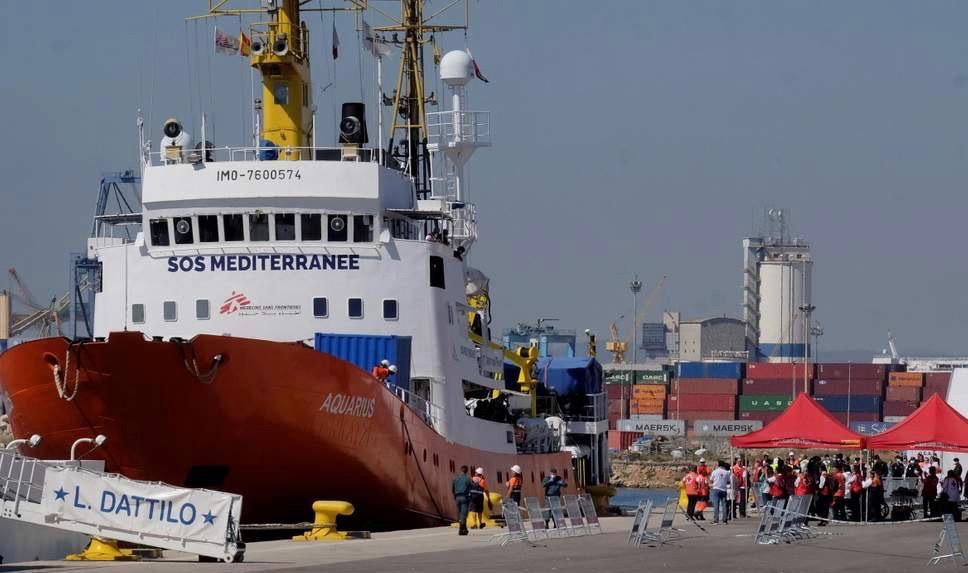A European Game of Humanitarian Chicken Where the Only Winning Move Is Not To Play
archive


A European Game of Humanitarian Chicken Where the Only Winning Move Is Not To Play
The exponential rise in the number of refugees, migrants, and displaced peoples—now at roughly 68 million, up from approximately 20 million in 2005—appears unlikely to stall.1 Widening wealth gaps, widespread political conflicts, and intensifying environmental disasters associated with climate change have become part of our 21st Century reality. Despite this international cause for concern, nation-states are doing the bare minimum or neglecting the global challenge entirely. In the recent case of the search-and-rescue vessel "Aquarius," the world saw European countries competing with each other to avoid taking responsibility for the 630 rescued North African migrants aboard.
The European asylum system requires that the country of first entry must process an asylum-seeker’s application, placing the bulk of the burden on just a few countries. Once asylum status is granted, the EU's relocation mechanisms take effect in theory, but in practice, these mechanisms have been implemented neither widely nor effectively. In fact, in 2016, the European Commission "acknowledged that the flows of refugees and migrants had weakened the EU asylum system."2 While the European Commission has tried to contend with the reality that global migration is on the rise, the majority of measures include emergency relocation plans for resettlement and other short-term measures—none of which are equipped to handle permanent global migratory shifts. Despite the E.U.'s transnational democracy, it remains primarily constrained by the Westphalia state system and the political fallout over the stranded Aquarius highlights these institutional shortcomings.
In June of 2018, a Franco-German NGO by the name of SOS Méditerranée in conjunction with Médicins Sans Frontiers operated the "the Aquarius" and rescued 630 migrants from the Mediterranean Sea with the intention of taking them to Italy. Once the boat approached Italian waters, Italy's new populist government refused it entry. Matteo Salvini, Italy's hardline anti-immigrant interior minister, took to Twitter to announce his decision using the hashtag #chiudiamoiporti (#closethedoors). The government of Malta, the next logical location for disembarking, followed suit. Over the next two days, the Aquarius and its passengers were stranded at sea, with limited supplies. The standoff between Italy and Malta to accept the Aquarius felt like a disheartening game of "chicken" clearly illustrating Europe’s policy failure. However, Spain was unwilling to play. The Spanish government voluntarily opened its Valencia ports to welcome the Aquarius and begin the asylum process for its passengers. Spain's prime minister, Pedro Sánchez, explained the decision by stating that Spain has a "duty to avoid a humanitarian catastrophe... to comply with [its] human rights obligations."3
Whereas Italy initially declared "victory" via Twitter for successfully closing its ports and thereby pressuring other E.U. states, Spain's triumph spoke much louder by shifting the global narrative from highlighting the dangers to state sovereignty to reaffirming the importance of international solidarity and human security. Its actions not only jumpstarted this conversation but also encouraged regional level responses to alleviate the migration burden—even among its less liberal neighbors.
Why Spain?
In this area of social policy, Spain has one of the best domestic environments to champion migrant and refugee rights for two critical reasons. The first is that anti-immigrant far-right parties remain very much at the fringes of Spanish politics, due to a relative lack of anti-immigration sentiment. Even in this case, media and civil society groups immediately dismissed conservative rhetoric that welcoming the Aquarius opens the migrant floodgates.4 The minister of Public Works and Transportation reiterated the government’s position that accepting the Aquarius was not just a matter of accepting immigrants, "it was a matter of respecting an international humanitarian vision."5 Bucking the European trend, Spain's population has placed demands on the central and regional governments to accept more Syrian refugees, for example. According to a recent report by a Spanish think tank, Spaniards generally tend to empathize with most immigrants and are reluctant to scapegoat immigrants by voting for far-right parties.6 Spain's decades-long experience with the far right under Franco's dictatorship is a chapter of Spanish history that few would like to revisit. In fact, Spain's democratization process was a direct response to and rejection of the kinds of policies and rhetoric espoused by the far-right parties of its European neighbors today.

June 2018: rescue ship Aquarius carrying hundreds of migrants docks in Valencia, Spain. Image: Reuters
The second reason that Spain tends to champion migrant rights is that it has a relatively weak national identity—also for reasons related to its fascist past. Spain's dictatorship from 1939-1975 relied heavily on national and Catholic symbols, actively suppressing virtually all forms of cultural diversity including strong regional ethnocultural identities. Spain's democratization process was peaceful and widely-supported at all levels, from the newly instated king to civil society groups. It sought to establish institutions that could redress the suppression of diversity under Franco's regime, ultimately creating a federal structure that could both accommodate ethnocultural demands of greater autonomy (primarily from Catalonia and the Basque Country) while retaining national political unity. Spain's democratization process helped to establish a cosmopolitan understanding of citizenship, in which cultural diversity is an asset that strengthens social ties.
Today, Spain’s administrative structure provides a cultural and institutional structure that facilitates immigrant and refugee incorporation. Spain's federalism offers more opportunities for migrants to access social services at local levels in ways that are distinctly separate from processes and institutions associated with immigration and national security. In other words, national immigration policies are not explicitly linked to welfare policies allowing local governments and civil society groups to attend to human security concerns without having their hands tied by national security fears. These domestic priorities have shaped Spain’s humanitarian foreign policy, which now serves as an essential reminder of the international human rights and humanitarian norms that once influenced Spain’s democratization.
From national sovereignty to human security?
Spain’s actions have pressured its European neighbors to accept partial responsibility for migrants seeking asylum. France not only publicly scolded Italy for refusing to let the Aquarius dock, but it has also received 80 of the original 630 Aquarius passengers, while also offering assurances that they will qualify for refugee status.7,8 Even Italy, despite its continued hardline response, has been pressured to open its ports to 450 migrants at least until the E.U. has negotiated its asylum policies. The country has now agreed to allow another boat to disembark in Sicily, following the announcement that France, Germany, Malta, Portugal, and Spain each decided to take 50 migrants. Libya and the Czech Republic refused.9,10
Spain's democratization process helped to establish a cosmopolitan understanding of citizenship, in which cultural diversity is an asset that strengthens social ties.
The Aquarius event highlights the broken European and international system relating to global migration, and points to the flaws in the Westphalian international system. Although Spain has since acknowledged that it cannot provide the necessary individual attention and social services to all those seeking asylum, it continues to uphold humanitarian and European principles. The European Union prides itself as a global beacon of liberal democratic possibilities and cross-border freedom, and Spain's actions are an attempt to sustain that image. Pedro Sanchez has overtly called for "European solidarity [that is only possible by] resolv[ing] a communitarian vision and common integration and asylum policy."11 At the European mini-summit on migration that took place just weeks after the Aquarius standoff, EU leaders agreed that countries have an obligation to help rescued Mediterranean migrants and that there should be shared effort to assess asylum claims. Additionally, they reiterated a need to explore closer cooperation with non-EU countries and well as the UN refugee and migration agencies. While the details of these agreements remain vague, these policies issues took center stage and forced EU leaders to reassess their global values.
Perhaps right-wing populist rhetoric does get one thing right, and it is this: policy frameworks characterized by national sovereignty are entirely unequipped to deal with these migration challenges, which will only continue to worsen. Yet the populist line of thinking that leads to sealing borders, separating families, suspending rights, and denying humanitarian assistance is equally unsustainable. Sealing national borders is not a suitable alternative to long-term sustainable policies, because nationalist approaches will not be able to adapt to global demographic changes that cannot be contained or resolved by states alone.
In the aftermath of WWII, international humanitarian commitments and the international human rights regime emerged in response to a clear need to place the interests of individuals over the interests of states. Today, global migration is one of the world's most significant political challenges and is likely to usher in long-term global demographic shifts. Once countries come to recognize that their apparent interests to seal off the borders can result in graver migration-related humanitarian crises over time, the sooner we can begin to redesign institutions and policies that are more appropriate to handle future migration-related human security challenges.
1. United Nations High Commissioner for Refugees (UNHCR), “Figures at a Glance.” (date accessed: Aug 20, 2018). See also UNHCR, “2005 Global Refugee Trends.” (Date accessed: Aug 20, 2018).
2. Defensor del Pueblo, "A study of asylum in Spain: International Protection and Reception System Resources." Spanish Ombudsman. PDF available (Date accessed: July 30, 2018).
3. BBC, “Spain to accept disputed migrant ship Aquarius.” BBC News. (Date accessed: July 3, 2018).
4. Agenicas/ Redacción el Huffpost, “El ‘efecto Aquarius’ no existe.” MSN Noticias. (Date accessed August 6, 2018).
5. Ibid.
6. Carmen Gonzalez-Enríquez, “The Spanish Exception: Unemployment, inequality, and immigration, but no right-wing populist parties.” Elcano. (Date accessed July 30, 2018).
7. BBC, "Stranded migrants: Macron scolds Italy over Aquarius Ship." BBC News. (date accessed Aug 2, 2018).
8. María Martín, “Francia recibe como refugiados a 80 de los rescatados por el ‘Aquarius’.” El Pais. (Date accessed: August 2, 2018).
9. BBC, "Italy allows migrants to land in Sicily." BBC News. (Date accessed: August 2, 2018).
10. BBC, “Migrant crisis: Italy to accept arrivals until deal reached.” BBC News. (Date accessed: August 2, 2018).
11. Juan Sanhermelando, “El gesto del Aquarius deja a Sánchez aislado ante la minicumbre sobre inmigración.” El Español. (Date accessed: August 6, 2018).
All Spanish to English translations are my own.



